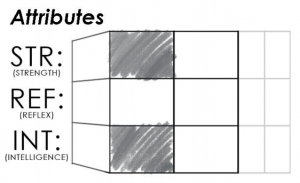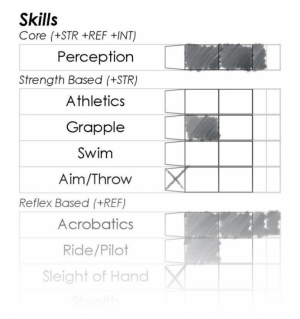Cogent Quick Guide: Difference between revisions
Jhwblender (talk | contribs) |
Jhwblender (talk | contribs) |
||
| Line 65: | Line 65: | ||
====== Combat Skills ====== | ====== Combat Skills ====== | ||
Skills relavent to combat situations learned from the vocation. They are different in two important ways. 1. They must be selected from the following pre-determined list (unless differing from Narrator's discression). | |||
''Melee'': | |||
* Unarmed | |||
* Small Weapons | |||
* Medium Weapons | |||
* Large Weapons | |||
* Reach Weapons | |||
''Ranged'': | |||
* Short Stringed | |||
* Long Stringed | |||
* Hand Ballistic | |||
* Shoulder Stocked Ballistic | |||
* Heavy Ballistic | |||
and 2. These are the only skills that can be used in combat. | |||
== Play Modes == | == Play Modes == | ||
Revision as of 23:06, 5 November 2021
Introduction
Cogent is a narrative focused table-top role-playing game similar to D&D (Dungeons and Dragons) which was created by Josiah Brooks (Jazza) and Shad Brooks (of Shadiversity). It was created to address problems with other role playing games. It's designed to not be overburdened by rules and be flexible to any setting and story.
_Please visit the official rules linked in the external links for more detailed information_
Rules of Play
Dice Pools
When a player is asked to overcome some challange, a dice pool is used. A dice pool is made up of multiple D6s (6 sided dice). The number of dice is made up from adding the appropriate number of points between the related skill and attribute then +3 dice.
Challenge Levels
When performing a task, the narrator may ask the player to roll a dice pool based on the appropriate statistics. The narrator will assign a challenge level (1-8) depending on difficulty. The appropriate number of dice are rolled. Each dice that rolls a 4, 5, or 6 are counted as "Wins".
Character Creation
Identity
Think of a character you wish to play. Avoid using architypes to guide the character as people in real life are complex and motivated by different things. Give them a name, a History, beliefs/morality, and goals/aspirations.
Statistics
The statistics are split into two categories, Attributes and Skills. The statistics determine the bonuses or penalties when rolling against challenge levels.

Attributes
Representing the physical and mental abilities of the character, there are 3 core attributes. A filled in box is +1 point to that attribute with the exception of the first tapered boxes. Those are negative points given by the narrator based on a disabling characteristic or an injury. Each attribute has a unique advantage. 4 points can be given in total to one category.
| 0 Points | 1 Point | 2 Points | |
| Strength | Average | Professional Soldier or Career Rock-climber | Olympic level weightlifter or world champion fighter |
| Reflex | Average | Circus Acrobat or Accomplished Thief | Gold medalist gymnast or master martial artist |
| Intelligence | Average | University science professor or a Career Politician | Award-winning particle physicist or ‘Sherlock Holmes’ level detective |
*under special circumstances the narrator can allow the assignment of more than 2. This would be superhuman level

Strength
For every point in strength the character can reduce a victory level achieved against them in combat once every combat encounter.
Reflex
In combat, the player with the highest reflex gets priority in their action.
Intelligence
For every point in intelligence the player receives 3 additional skill points to spend.
Skills
Rrepresenting a character's learned abilities, Additional points may be earned in the creation phase through accepting a disabling characteristic. Like attributes, a max of 4 points in an attribute can be given. Also, negative skill points can be applied to the skills through the crossing out of the tapered first box. A negative skill point can be chosen by the player and applied elsewhere. This however can only happen with one point. Skills are divided into two categories: Core Skills and Vocational Skills
Core Skills
Strength/Reflex/Intelligence based skills. These cannot be added to combat rolls, however they can be added (or subtracted) through an assist.
Vocation & Vocational Skills
Skills that are learned based on the history of the character. The player must work with the narrator in picking the vocation. Points in vocational skills are pulled from the same pool as the core skills. Each player MUST have at least one vocation. Unemployed characters can have life goals or ideas like "Drifter" or "Murderer". One free skill point is assigned to your first vocation. One core attribute is attributed to each vocation and determines which attribute is added to the dice pool for a vocation check. Vocations cannot be used to make skill checks. They are only "assist" skills. Not all vocational skills need to be filled; They can be earned through the game. Vocational skills may not individually have more points than the parent vocation. These skills come in two flavors. Vocational Skills and Combat Skills.
vocational Skills
Unique talents and specialized skills learned from following the vocation. Always allowed with assists and may only be used for a direct skill check if the check is not better represented by a core skill.
Combat Skills
Skills relavent to combat situations learned from the vocation. They are different in two important ways. 1. They must be selected from the following pre-determined list (unless differing from Narrator's discression).
Melee:
- Unarmed
- Small Weapons
- Medium Weapons
- Large Weapons
- Reach Weapons
Ranged:
- Short Stringed
- Long Stringed
- Hand Ballistic
- Shoulder Stocked Ballistic
- Heavy Ballistic
and 2. These are the only skills that can be used in combat.
Play Modes
Fast Play
player characters will be given 2 Attribute points and 12 skill points they may assign to their character during character creation.
Campaign Play
players will start with less attribute and skill points and gain more during play the course of their adventure.